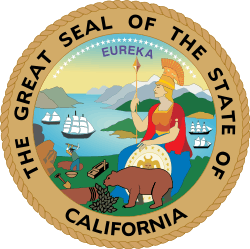California Proposition 57 (2016)
| Elections in California | ||||||||||
|---|---|---|---|---|---|---|---|---|---|---|
 | ||||||||||
|
||||||||||
|
||||||||||
Proposition 57 was a California ballot proposition, approved on the November 8, 2016 ballot. The Proposition allows parole consideration for nonviolent felons, changes policies on juvenile prosecution[1], and authorizes sentence credits for rehabilitation, good behavior, and education. The passing of the proposition and its implementation may result in tens of millions of dollars of annual saved state funds. This proposition allows juvenile court judges to determine whether or not juveniles aged 14 or older should be prosecuted and sentenced as an adult. Due to the approval of the proposition, the California Department of Corrections and Rehabilitation will begin to execute new parole and sentencing provisions and ensure that they enhance the safety of the public.[2]
In March 2000, primary voters passed California Proposition 21 (2000). The measure removed juvenile court judges' decision to try a young offender as a juvenile or adult, and gave the right to the decision exclusively to prosecutors.[3] Prosecutors are given 48 hours after the arrest to determine whether or not they want to directly file charges against violent juveniles as an adult.[4] Since then, different jurisdictions varied widely on the prosecution of juvenile delinquency. San Francisco directly filed adult charges against zero juveniles, while Yuba County, California directly filed adult charges against 55% of juveniles.[3] Prosecutors became twice as likely to directly file adult charges against Black and Latino juveniles than against white juveniles.[4]
Proposition 57’s proponents sought to restore juvenile court judges’ authority over juvenile offenders, though Governor Jerry Brown also wanted to reduce mass incarceration.[3] The California Department of Corrections and Rehabilitation has been under federal court supervision since the Supreme Court of the United States found that California’s prison overcrowding was such that it constituted cruel and unusual punishment (Brown v. Plata, 2011). Governor Brown added to Proposition 57, amending the Constitution of California so as to reduce this overcrowding.[3]
Proposition 57 allows the parole board to release nonviolent prisoners once they have served the full sentence for their primary criminal offense.[5] Previously, prisoners may have been required to serve extra time by a sentence enhancement, such as those for repeated offenders.[5] Proposition 57 would also require the Department of Corrections to develop uniform parole credits, which would reward prisoners' good behavior with reduced sentences.[5] Governor Brown predicts Proposition 57 would allow him to parole up to 1,300 additional prisoners a year.[5]
Proponents have spent $11.75 million fighting for the measure, with the top contribution being $4.14 million raised by Governor Brown.[5] Other proponents responsible for significant contributions include the California Democratic Party, Tom Steyer, Reed Hastings, and the Open Philanthropy Project.[5] The measure is supported by the editorial boards of the Los Angeles Times,[6] the San Francisco Chronicle,[7] and the Sacramento Bee.[8]
Opponents of the Proposition have spent $641,326 fighting against the measure. Opponents responsible for high contributions include Los Angeles County police unions and a prosecutor lobbying group.[5]
A September 2016 poll from USC Dornsife / Los Angeles Times showed that 66% percent of registered voters were in favor of Proposition 57, 26% were opposed, with 8% unknown.[9]
Proposition 57 was approved by voters in the November General Election, with 63.6% voting in favor of the movement.[10]
References
- ↑ "Proposition 57. California General Election November 8, 2016. Official Voter Information Guide.". California Secretary of State. Retrieved 10 October 2016.
- ↑ "Prop 57 Analysis | Official Voter Information Guide | California Secretary of State". voterguide.sos.ca.gov. Retrieved 2016-10-11.
- 1 2 3 4 Lantigua-Williams, Juleyka (9 September 2016). "Treating Young Offenders Like Adults Is Bad Parenting". The Atlantic. Retrieved 28 October 2016.
- 1 2 Klivans, Laura (10 October 2016). "Explainer: Why and How Kids End Up in Adult Court". KQED News. Retrieved 28 October 2016.
- 1 2 3 4 5 6 7 Lagos, Marisa. "Election 2016: Proposition 57". KQED News. Retrieved 28 October 2016.
- ↑ The Editorial Board of the Los Angeles Times (5 October 2016). "Prop 57 is a much-needed check on prosecutorial power. Vote yes". The Los Angeles Times. Retrieved 28 October 2016.
- ↑ The Editorial Board of the San Francisco Chronicle (11 September 2016). "The Chronicle recommends: Yes on Prop. 57". The San Francisco Chronicle. Retrieved 28 October 2016.
- ↑ The Editorial Board of the Sacramento Bee (27 September 2016). "Prop. 57 would fix a mistake, help rehabilitate felons". The Sacramento Bee. Retrieved 28 October 2016.
- ↑ "USC-Dornsife/LA Times Poll". USC Dornsife September 2016 Poll. September 2016. Retrieved 11 October 2016.
- ↑ "California Proposition 57, Parole for Non-Violent Criminals and Juvenile Court Trial Requirements (2016)". Ballotpedia. Retrieved 12 November 2016.